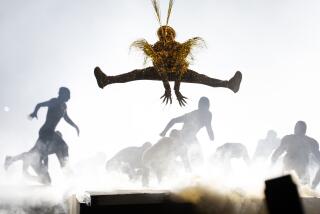Centennial Celebration : 100 Years After First Olympic Games in Athens, Atlanta Stages Summer Spectacle
- Share via
ATLANTA — One hundred years ago the modern Olympics began and Friday night the 1996 Summer Olympic Games opened with hundreds of reminders of that anniversary. The sounds of the Atlanta Symphony Orchestra echoed through Olympic Stadium on a steamy Southern night during which 100 children would gather on the field to form the number “100,” 100 percussionists would play backup to the orchestra and 100 U.S. Army trumpeters would herald the arrival of the Olympic flag.
With President Clinton in attendance, a long day of ceremony reached its peak Friday evening, when the traditional parade of nations began about 7 p.m. PDT. In what is the biggest Olympics staged in the Games’ 100-year history, 197 nations were to march into the stadium, some with barely a handful of athletes, others hundreds strong.
The U.S. delegation--at 700 the largest of the ceremony-was to be the last to enter the stadium, led by wrestler Bruce Baumgartner, the flagbearer and a four-time Olympian. Teresa Edwards, another four-time U.S. Olympian, celebrated her 32nd birthday with the honor of serving as the athletes’ oath-taker.
“At the opening ceremonies, you feel like the world is under one roof,” said Edwards, a member of the women’s basketball team. “It’s so exciting. You don’t really need motivational speeches and you don’t need someone patting you on the back. You just stand in the middle and take it all in.”
For the first time, every delegation invited to the Games will attend. That includes Vietnam, which is participating in its first Games on U.S. soil; first-time nations such as St. Kitts and Nevis, two islands in the Caribbean; and Comoros, an island in the Indian Ocean. Among the more well-known flagbearers in tonight’s procession were Mozambique’s Maria Mutola, the favorite in the 800 meters; French runner Marie-Jose Perec; and Somalian Abdi Bile, who ran for George Mason University in the 1980s.
Also carrying their countries’ colors were Jamaican sprinter Juliet Cuthbert; Latvian Eimars Tupuritis, who won the NCAA 800-meter championship for Wichita State in May; and Ukraine’s Sergei Bubka, the world record holder in the pole vault.
“This is going to be the highlight of my sporting career,” Baumgartner said. “When that flag is going over my head and my heart is just pounding, I will feel so proud.”
The Games’ greatest honor--the selection to serve as the final torchbearer and light the Olympic caldron--was still a closely guarded secret as the ceremonies opened, and the flame itself was not to reach the stadium until just after 9 p.m. PDT. The torch run, which began in the United States in Los Angeles in late April, spanned 15,000 miles and 42 states and the District of Columbia, with Friday night’s unknown runner the 10,000th individual to carry the flame. All through this day, the torch wended its way through this city and its suburbs, where, even in the pre-dawn hours, hundreds gathered on sidewalks outside late-night restaurants and bars to cheer the procession, including a naked bicyclist and a college student in boxer shorts with a flaming lacrosse stick.
Friday afternoon in downtown Atlanta, where many major streets were closed and city officials were urging office workers to leave early, there was a palpable sense of anticipation, with the entire day geared toward tonight’s celebration.
The opening ceremonies--replete with music, dance and the traditional speeches--were carefully crafted to combine both Olympic history and the culture of the nation, the region and the city. The pageantry included cheerleaders and a high school marching band, those most American of symbols, as well as music and dance intrinsic to the South. Gladys Knight sang “Georgia on My Mind,” and a group of step dancers performed.
And, in what was anticipated to be one of the most moving segments of the ceremony, organizers scheduled a tribute to Martin Luther King Jr., the most famous citizen in Atlanta history.
“An opening ceremony makes a community think about itself,” said Don Mischer, the executive producer of both the Opening and Closing Ceremonies. “We have spent over a year researching how best to represent the South and Atlanta and the nation. . . . But on a field with 85,000 spectators, you cannot teach history. You must work with music and costumes and imagery and abstraction.”
For all the pomp and circumstance, though, the ceremonies were, as always, about the athletes.
There is hardly a more stirring Olympic vision than the sight of all those faces streaming into the stadium, with all the cheering and the emotion, and the dizzying array of national colors that creates an amazing montage. It is one evening of unity for nearly 11,000 athletes from disparate cultures, one amazing assemblage before they all go off to their separate venues, competitors once again.
“I’m going to soak this in,” said Edwards, whose first game is scheduled for the second day of competition. “It’s a lifetime opportunity for me. But I will come back down. The Cubans will wake me up very quick Sunday.”
More to Read
Go beyond the scoreboard
Get the latest on L.A.'s teams in the daily Sports Report newsletter.
You may occasionally receive promotional content from the Los Angeles Times.






